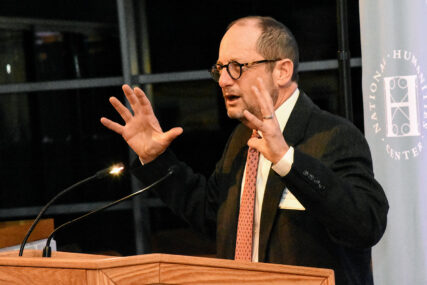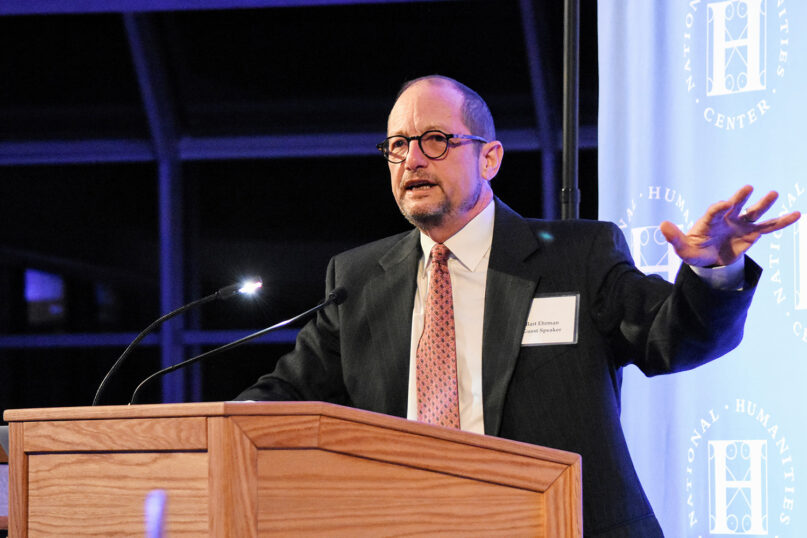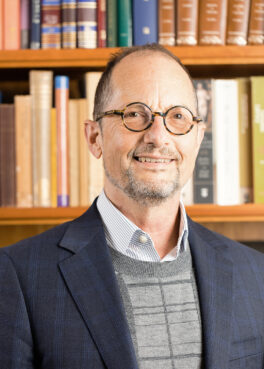(RNS) — Bart Ehrman’s blog regularly disabuses readers of their preconceptions about Christianity and its origins.
No, the devil does not appear in the Garden of Eden — or anywhere in the Hebrew Bible (though the word “Satan” appears elsewhere a handful of times).
No, the doctrine of the Trinity does not appear in any of the earliest versions of the First Epistle of John. (It first shows up in a manuscript from the 14th century.)
No, Jesus did not believe the righteous go to heaven. More likely he thought God would physically resurrect the dead as part of a new kingdom on Earth.
One of the most renowned scholars of the New Testament and early Christianity, Ehrman, a professor at the University of North Carolina at Chapel Hill, is famous for his many popular books, college textbooks, Great Course lecture series, appearances on public radio’s Fresh Air and on National Geographic and History Channel specials.
But his most loyal followers read his musings five, sometimes six days a week at The Bart Ehrman Blog, a 10-year-old subscription-based platform that predates the likes of Medium, Patreon or Substack.
There, nearly 8,000 subscribers who want to reexamine what the Bible actually says and what scholars have to say about it will find a welcoming community of fellow questioners.
Ehrman, who calls himself both agnostic and atheist (he doesn’t know if there is a God, but he doesn’t believe there is), insists he’s not out to undermine anyone’s faith. He’s a historian who methodically and systematically works to analyze and evaluate primary sources.
But there’s a part of him that still acknowledges and honors his abandoned Christian faith and what he sees as its teachings — such as giving to charity.
Last year Ehrman’s blog took in $503,000 in subscription dues — all of which he donated to five charities: Doctors Without Borders, CARE (an international humanitarian agency) and three North Carolina-based nonprofits that provide food, housing and reading instruction.
Since he started the blog in 2012, he has raised an estimated $1.9 million for charity. He expects to top $2 million next month.
“Ten or 12 years ago, I felt bad I wasn’t doing much for charity, like volunteering in a soup kitchen,” Ehrman said. “Then it occurred to me, ‘Maybe I could use my distinctive skills as a way of doing something for charity.’ This is something I can do that others can’t.”
The blog is based on a four-tiered membership structure that begins at $29.95 a year and goes up to $200 a year for a platinum membership, which includes occasional Zoom lectures and allows members to contribute an occasional post.
He pays two part-time employees to run the site from money he generates through other sources, and doesn’t take a cut himself.
Ehrman said he spends about two hours a day writing 1,200-word posts and corresponding with subscribers. Most posts are framed as a question: Did Jesus actually come from Nazareth? (Answer: Yes; the Bethlehem story notwithstanding.) Did the Apostle Paul write the Epistle to the Colossians? (Most scholars think he didn’t.) Is the Martyrdom of Polycarp authentic? (The letter attesting to the burning and stabbing of an early church bishop is probably a forgery.)
RELATED: Bart Ehrman on why everything you’ve been told about heaven and hell is wrong
His readers admire his mastery of biblical and historical knowledge presented in clear, accessible prose.
“You spend your whole life and never hear anything about stuff like this,” said John Chandler, a lapsed Episcopalian from Atlanta and one of Ehrman’s subscribers. “Church education — quote Bible study — doesn’t touch on any of the facts or history of it at all.”
Fellow scholars are also in awe of Ehrman’s dedication to the blog and to the work of disseminating scholarship beyond the confines of the academy.
Mark Goodacre, a New Testament professor at Duke University who has written for Ehrman’s blog on occasion, remembers attending a conference with Ehrman at which a group of scholar friends decided to go out for a beer. Ehrman declined. He owed his readers a blogpost and went up to his room to write it.
On a recent Saturday Zoom lecture for platinum members, Ehrman greeted 54 subscribers by name and asked them how they’re doing. On this call and others they might include a world-class conductor; a lawyer who has represented several Guantanamo Bay prisoners; several doctors; and businesspeople of various sorts.
Despite his reputation as a brainy, discerning, analytical thinker, Ehrman is warm and vivacious, with a rip-roaring laugh. With his trademark retro round specs and scraggly salt-and-pepper goatee, he looks like a laid-back, if aging, rock star.
His prodigious schedule, however, is anything but laid back. Ehrman, 67, rises at 6. He reads Homer in Greek (the best part of his day, he says) and does 30 minutes of Pilates before getting to work.
This semester he’s teaching two undergraduate courses at UNC besides serving on various academic committees. He has a podcast. And he’s launched an online, for-profit lecture platform. (The latest, an eight-part series on “Finding Moses” goes for $59.95. Soon to come: an eight-lecture series called “The Unknown Jesus.”)
Ever since his breakout 2005 bestseller, “Misquoting Jesus,” Ehrman has churned out more than two-dozen trade books.
In his new book, “Armageddon: What the Bible Really Says about the End,” due out March 21, he argues the Book of Revelation is not a blueprint for the end times, nor is it a proclamation of hope for all who are suffering.
“He masters the art of taking the most complex, hermetically sealed scholarship that’s supposed to belong to a world none else can access and letting us mortals read the arguments,” said Priscilla Painton, vice president and editor-in-chief at Simon & Schuster, who has edited some of his books.
Ehrman said the key to it all is discipline. “I’m very efficient. I can get a lot done in a short amount of time.”
With the exception of football and basketball (he has season tickets to UNC games), he doesn’t watch TV. He and his wife, Duke English professor Sarah Beckwith, watch a classic Criterion Collection movie once a week.
Ehrman grew up in Kansas, embraced evangelical Christianity as a teen and went on to Moody Bible Seminary and later Wheaton College. He got his Ph.D. from Princeton Theological Seminary, writing his dissertation on a fourth-century church father, Didymus the Blind. As he analyzed the theologian’s quotations of the gospels in his commentaries and compared them to early biblical manuscripts, Ehrman began to lose certainty about his faith.

Bart Ehrman is a blogger and philanthropist who also publicly speaks at events and conferences. Photo by Joel Elliott, courtesy Ehrman
In “The Orthodox Corruption of Scripture,” published in 1993, he looked at how scribes of the second and third centuries occasionally altered New Testament Scriptures in response to the theological arguments of their day. He was still a Christian, now an Episcopalian who taught Sunday school, when he wrote that book. A few years later, he quit the church entirely.
Ehrman said he never gets bored of his subject.
“Today, I had a 20-minute conversation with a colleague trying to explain to him why I think there’s a Q,” Ehrman said, referring to the collection of Jesus’ sayings that many scholars believe preceded the gospels. “I got really pumped up about it.”
Navigating the questions at the heart of the Christian faith is what animates his blog’s readers, too.
For Dave Bohn, a retired accounting and finance professional, Ehrman’s blog has been nothing less than liberating. He grew up a Southern Baptist believing the Bible is inerrant but was always puzzled by certain passages.
“I was searching and in fact, hurting. Why was I believing this?” said Bohn, 65, who lives outside New Braunfels, Texas. “As I was making a transition away from conservative Christianity, I came across one of Bart’s books.”
Bohn said he appreciates Ehrman’s calm, gentle, non-judgmental attitude.
“I had cultural things that had hooks in me. Bart’s writings helped me get over the hump. It gave me the tools to rise above it. I became emotionally free not to be captivated by it.”
Ehrman already has a plan for his next book. It will be about charity. He said the Jewish idea of giving to the poor — adopted by Jesus — was entirely alien to the Greek and Roman world. And yet, when Christianity became the official religion of the Roman Empire, it became the gold standard of ethics.
That, too, he said, deserves to be more broadly known and taught.
RELATED: Bart Ehrman’s latest: How Christianity took over the Western world






